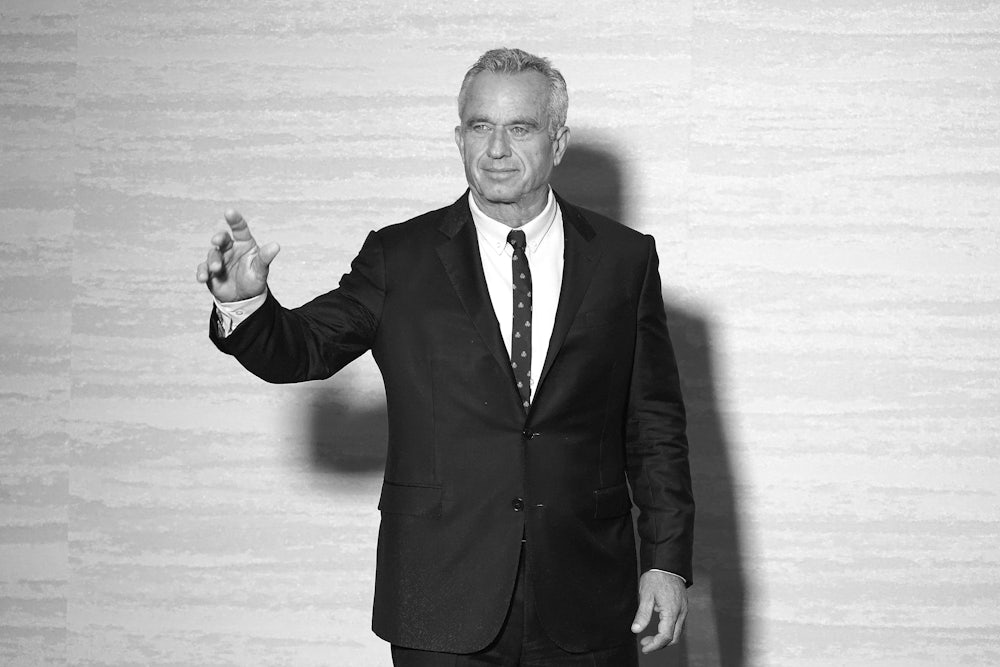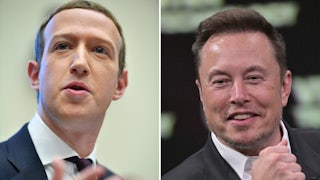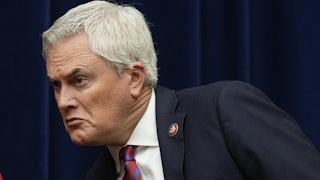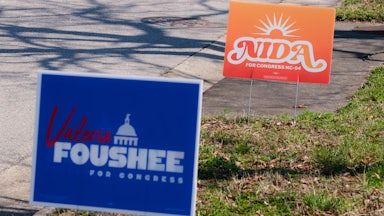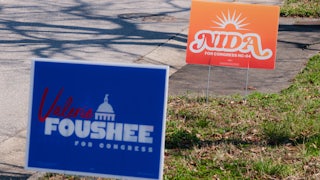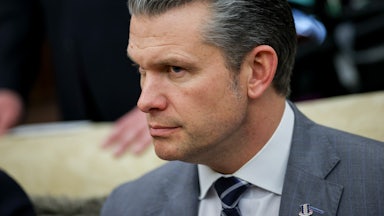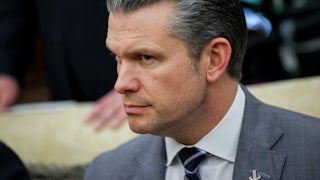You might think, in a two-party democracy where the man who is a dead-on bet to be the presidential nominee of one of those parties has all but pledged to wipe out said democracy and promised to use his second term to destroy all internal enemies, that the rest of the society would band together to try to prevent that from happening.
That Donald Trump has so pledged is, to everyone who is not a supporter of his, beyond dispute. He has stated many times some version of his belief that “the greatest threat to Western civilization” is “some of the horrible, USA-hating people” in our midst, by which he means the many millions who disagree with him. When he was president, his people were preparing a plan for a possible second term that involved firing thousands of government employees and replacing them with staff loyal to him. He called for the termination of the Constitution’s rules that allowed Joe Biden to win in 2020, even though those rules worked properly to elect the person who won. He led a riot against the U.S. government to overthrow the election results. He calls the press the “enemy of the people.” There’s no telling what a new Trump term would bring. Our democracy would be disfigured at best and at worst destroyed.
You’d think people would take that pretty seriously. If we were all watching a Star Trek episode in which a teetering democratic society faced an imminent, dangerous threat, we’d be cheering for the society to come to its senses and work in unison to defeat the threat. That’s what should be happening in real life. But instead, a lot of people have chosen this moment, when the democracy is hanging by a few tattered threads and its future depends directly on the result of next year’s election, to say, Hey, let’s have some fun! This is all a game anyway.
Well, it’s not a game. And it’s astonishing to me that people can be so blithe about it. Let’s look at four (or four and a half) examples.
First, Robert F. Kennedy Jr. has decided that this is the right time to run a quixotic and corrosive presidential campaign whose end result can only be to fuel cynicism not just about Biden but about the whole system. That’s the inevitable outcome when a crackpot conspiracy theorist who spouts nothing but lies is given a platform like the one Kennedy now has.
His latest WTF moment, that Covid was “targeted to attack Caucasian and Black people” and that Jewish and Chinese people were most immune, may finally have signaled to the political-media establishment that this guy should not be indulged any further. Let us hope so. He won’t come close to winning the nomination. His support has slipped since the spring—he’s been polling at single digits in some state polls.
That isn’t the threat. The threat is that his out-there beliefs and cuckoo theories and refusal to denounce expressions of support from right-wing extremists up to and including Alex Jones (in his recent interview with David Remnick) lend support to the Trumpian view of the world. If his Democratic support ends up being a disgruntled 6 or 7 percent, without him on the November ballot, won’t the bulk of that 6 or 7 percent turn to the guy who sounds most like him? And in Wisconsin, Georgia, and a few other close states, that could be the ball game.
Second, we have Cornel West’s decision to run with the backing of the Green Party and to have his campaign managed by Jill Stein, whose own 2016 presidential campaign was supported by media blitzes from Russian internet trolls directed by Moscow. A well-known Russian troll farm owned by a close ally of Vladimir Putin tweeted “Jill Stein” more than 1,000 times around the time of that election, NBC News reported.
Since I’m “you might think”ing here: You might think that past support from the regime of a murderous autocrat who crushed the fledging movement toward democracy in his own country and has since gone on to start a war that has included the bombing of civilian hospitals and attacks on hundreds of other health care facilities, as well as on schools and kindergartens and churches, would, to a man of the left, prohibit such a person from managing his campaign. Oh—Stein also opposes U.S. support for Ukraine today. But to West, none of this is disqualifying.
There are things about West I have admired. Race Matters was an important, insightful book. His long-ago reflections on Christianity and Marxism were valuable, and his dialogues with Michael Lerner on Black-Jewish relations were constructive at a time when that was sorely needed. But this campaign—and he will presumably be on many ballots in November—can have only one practical effect: to help the anti-democrat by stealing some votes from Biden in key states.
And by the way—with respect to Russia, West last week on CNN squarely blamed the United States for Putin’s invasion. He was also critical of Putin. Fine. But his campaign website calls for disbanding NATO, which would give Putin Ukraine and everything else he wants.
Third—and far, far more potentially destructive of democracy than West or even Kennedy—is the effort by the “centrist” group No Labels to run a “unity ticket.” Being perhaps overly charitable, I’ll grant that on some level, No Labels may be expressing a genuine frustration on the part of moderates about the two-party system (more on which later). But these are political professionals, deep insiders, and they all understand very well that their efforts are likely to help elect the anti-democrat. And they don’t care. In fact, what we know so far tells us that the people at No Labels prefer the anti-democrat.
Nancy Jacobson, the group’s CEO, stays mum on such matters. But her husband, Mark Penn, has gone on Fox News and written columns for its website that build up Trump and belittle Biden. Penn issued a blanket denial last week to TNR’s Daniel Strauss about having any involvement with No Labels. I guess in due course we’ll learn the truth of the matter. In the meantime, if Penn really thought that Trump was a danger to the republic, you know what he could do? He could simply say so.
So could Joe Lieberman, the No Labels founding chairman. But he has been, it is very much worth remembering, a quiet Trump supporter for years. Trump interviewed him for the job of FBI director in 2017 after firing James Comey. Lieberman withdrew his name—not out of any reservations about joining a Trump administration, but because Trump had already named a Lieberman law partner to another position, and Lieberman feared his elevation would create the appearance of a conflict.
Lieberman has said he’d back Biden head-to-head against Trump. That’s nice. But in the meantime, look at it this way. We have one candidate who is “normal” in the context of American presidential electoral history. We have another candidate who has already proven he is way outside normal, given that he watched eagerly as a mob sought to kill his own vice president. And No Labels wants to run another normal candidate, obviously splitting the normal vote. And they’re doing so under color of the most mendacious rhetoric, about “unity” and “common sense” and the preposterous idea that this candidate of theirs could win.
So these are three examples of three different spots on the spectrum—left, center, and conspiracy-driven right—deciding that the election in which American democracy faces its gravest threat since 1860 is just the right time not to take that threat seriously. But this impulse isn’t limited to the electoral realm, which bring us to our fourth culprit, David Zaslav, and his intentions to make CNN more palatable to MAGA viewers.
Zaslav is undoubtedly in a panic about the future of cable news, which looks bleak because so many people are cord-cutting. I acknowledge that anyone in that position would be feeling the heat. That said, is treating the anti-democracy candidate and his cohort more “fairly” really what Zaslav wants to be his legacy, especially if Trump wins? Does Zaslav not understand that CNN will be one of President Trump’s top targets? Trump in 2017 urged his Justice Department to block a corporate media merger because of his hatred of CNN. The network will inevitably be in his sights again. Is Zaslav simply trying to head that off? Alternatively, he could state simply that Trump is a danger and decide that CNN’s future course, should Trump win, would be to take a historic stand for press freedom.
But that would require courage, and courage is in short supply in today’s America when it comes to opposing Trump, defending democracy, and recognizing and articulating the stakes. This brings us to my fourth-and-a-half manifestation of laxity in the face of the authoritarian threat: this recent gossip that Jamie Dimon should jump into the presidential race. The JPMorgan CEO encouraged such speculation for a long time. He seemed to quash it last week, and he did tell The Economist that he “would worry about another Trump presidency.” That’s fine, if not particularly forceful. The posture of people like Dimon, and corporate and wealthy America generally, will be very much worth watching as this election goes along. I may have missed it, but I have yet to hear one of them say explicitly that preservation of the democratic-capitalist system that has enabled them to thrive is more important to them than getting the next tax cut.
We are in a strange and disturbing place as a country. People have varying degrees of enthusiasm for Joe Biden, which is fine and natural. Other people are fed up with “the two-party duopoly,” as it’s often put, and that’s fine too. But anyone who has studied the question—as the No Labels leaders surely have—knows that running long-shot presidential candidates is not the way one changes that. One changes that by changing the way we elect the House of Representatives (go look up “Duverger’s Law”).
I’d be all for that. It would be (a) interesting, (b) more democratic, and (c) probably good for reducing polarization. Until that day comes, we have only two parties and only two candidates who have a realistic shot at winning the presidency. People who actually understand how our system works get this. The choice next year will likely be between a candidate who will defend and preserve democracy and a candidate who will seek from his first hour in office to strangle it. I would think that choice would be clear. If Trump wins and follows through on what he says he will do, history will have a harsh verdict to render on all those who thought 2024, of all years, was the year to take his threats lightly.
